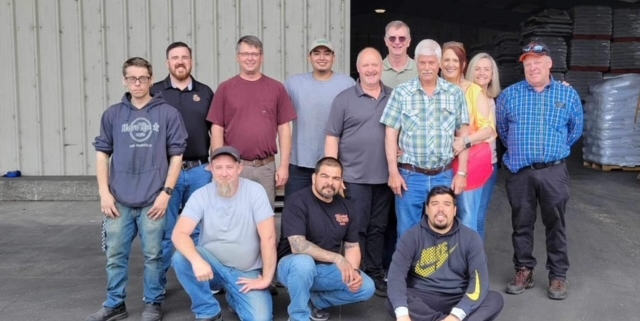Ampac Seed Co. Provides ‘One-Stop Shop’ for Customers
For Joe McAlhany Jr., there’s never a dull moment working in the seed business.
“I love the fact that no two days are ever the same. No two years are ever the same,” said McAlhany, General Manager of Ampac Seed Co. “It’s always fun to see where your products end up, and you really build some good friendships in this business.”
Founded in 1978, Ampac — short for “American Pacific” — produces around 25 million pounds of seed annually, including turfgrass, forage, and cover crops. The company contracts with farmers in Oregon and Canada to grow the seed, which then gets shipped across the country and around the world.
McAlhany has spent more than 20 years working in the industry. His family was one of the primary owners of OreGro Seeds, based in Albany, before selling the company to Nutrien Ag Solutions in 2017. McAlhany joined Ampac in 2021, leading an experienced team of 15 employees.
Whether it’s a soccer field in Australia or a farmer’s field in Kentucky, McAlhany said Ampac strives to be a “one-stop shop” to fill every customer’s needs.
“That’s where we want to be as a seed company, because so many distributors on the other end are reluctant to carry inventory,” he said. “They want to be able to go to one place to buy what they need and then ship it out.”
A Growing Market
Ampac is one of the oldest grower-owned seed companies in the Willamette Valley, McAlhany said. It was originally started by four different growers, though all but one has since moved on, leaving Pugh Seed Farm as the last of the original owners still standing.
McAlhany said the company is “pretty much split 50-50” between turfgrass and forage production. The market for cover crops is especially fast-growing in the U.S., he said, because of their bevy of environmental benefits — everything from improving soil quality and reducing water runoff to sequestering carbon.
“Cover crops are one of those few things where farmers and environmentalists can come together, because there’s so many things they can do for our soil and watersheds,” McAlhany said. “It’s something that we have a passion for, and it’s really just a unique market.”
In some cases, McAlhany said farmers who plant cover crops over a period of years can actually start seeing an increase in their bottom line. According to a USDA survey, corn yields went up 3.1% and soybean yields rose 4.3% after planting cover crops. Naturally healthier soils also mean farmers spend less money on chemical fertilizer, McAlhany said.
Uniting For Solutions
Looking ahead, McAlhany said water is likely to be the biggest issue facing Ampac.
As some areas around the West encourage xeriscaping to save water amid drought, McAlhany said the idea of a lush, green lawn has become like a dirty word in these markets. He said Ampac is working closely with breeders to develop more drought-resistant turfgrass varieties that require less irrigation while providing all the same advantages.
“Then we trial those products in markets where water is the biggest issue. That way, we can see how they’ll be received and how they’re going to be used,” McAlhany said.
McAlhany, who also serves on the Board of Directors for the Oregon Seed Association, said membership in OSA allows companies like his to learn more about complex issues affecting the seed industry and unite for common solutions. One example, he said, is advocating for digital labeling, which he called “a massive game-changer” for the industry.
“We’re heading in a good direction,” McAlhany said. “We’re excited about the future.”







